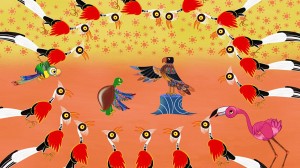My mother grew up in rural California. She spent a lot of her time outside and hiking. When she was a Girl Scout, she heard that when you are on your period you should avoid going in the great outdoors.
JE:”I always heard growing up that it wasn’t safe to hike or go camping while you were on your period. Apparently bears and other predatory animals can smell it and are more likely to attack. When I was growing up, two women were killed by a bear and the rumor was that it was because one (or both) of the women were menstruating.”
Me: Who told you this?
JE: My Girl Scout Leader was the most distinct person I can remember. There were some men at my church who wouldn’t let their daughters (my friends) because they thought that women should not hike, camp or even venture into the back county during their periods because it will attract predators who will come and eat them. This cautionary advice goes for women around the world. ”
Analysis: I researched the validity of this superstition, and it holds little scientific evidence. The superstition has a strong hold on people because it’s a pretty visceral- blood, gruesome attacks, young girls, etc. To me, however, it seems like a fear of bears morphed into an unfounded belief. At one point, this was perhaps a good way to keep young girls from exerting themselves in the woods when their families believed women should be at home. The stereotype only reinforces the idea that women are not as suited to survival in the wilderness as men.
For the Yellowstone Bearman’s advice on this folk belief, see:


